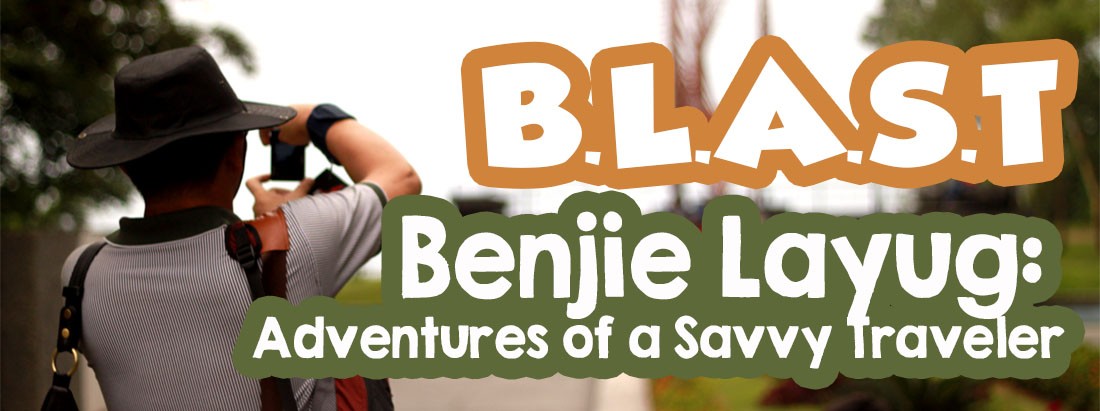
George Buid, John Louie Abrina, guide Reggie Lou Mendiola, Cris Gadion, the author and Mia Zamora at Sta. Victoria Caves (photo: Azrael Coladilla)
The highlight of our visit to the 200-hectare Ilagan Sanctuary was our exploration of the natural lattices, sparkling rocks, underground waterfalls and unusual rock formations of the nine-chambered, 400 m. long Santa Victoria Caves.
Located in the foothills of the Sierra Madre Mountain Range, they are comprised of more than 12 limestone caves known for their unusual but beautiful rock formations, subterranean waterfalls and their sparkling white calcite clusters. They form about a 25% of the 819-hectare Fuyot Springs National Park (FNSP).
Aside from the caves, the FNSP, now protected as a sanctuary covering four barangays, includes several rivers and creeks (Kabiran, Pasa, Nabulluan and Marabatbat) and forests. These caves also have archaeological significance, as they are believed to have once, in the past, housed the nomadic Dumagat or Agta people.
Check out “Ilagan Sanctuary”
At the pavilion at Prayer Mountain, we were assigned a required accredited tour guide by the name of Reggie Lou A. Mendiola. Aside from providing security, the knowledgeable guides also protect the beauty of the natural elements (stalagmites, stalactites, etc.) inside these subterranean geological marvels.
Joining me was Azrael Coladilla, Cris Gadion, Mia Zamora and photographers John Louie Abrina and George Buid.
From the pavilion, we boarded a golf cart that brought us to the jump-off point which is the Tree Top Adventure, an ecologically friendly Canopy Walk. Also within the area is the cable car station, the climbing wall and the convention hall. Before our hike, Reggie gave us a short orientation talk about the site and the trail we were about to take.
At the Tree Top Adventure we conquered our fear of heights, while navigating a series of seven wobbly wooden hanging bridges (below which is an obstacle course for kids), supported by steel cables 100 ft. high above the forest floor, between platform stations at endemic tree species.

Flowstone/dripstone rock formations – sheetlike deposits of calcite and other carbonate materials, formed when water flows down the walls
This lead us to the 89 m. long, three-chambered Main Cave, the largest of the four Class III caves of Sta. Victoria Caves that can be explored (the others are Adventure Cave, Moon Cave and Altar Cave). Except for Adventure Cave (you will have to kick it up a notch here), we explored the other three.
Class III caves are generally safe for inexperienced visitors. Only this cave type as well as certain parts of Class II caves may be available for ecotourism. As fruit bats inhabit these caves, flash photography was not allowed so as not to startle the creatures.
The dry, walk-through caverns were very easy to explore. Still, we had to watch our heads at some passages. The sparking rocks, of various shapes and sizes, glowed like crystals in the dark.
Moon Cave has a hole in the center where light enters. The 69 m. long Altar Cave has an altar-shaped fissure where a stolen religious ivory statue of the Virgin Mary was previously placed.
We imagined some of the peculiarly-shaped rock formations inside as a face, Casper, the Sto. Nino, a frog and cucumbers.
Sta. Victoria Caves: Ilagan Sanctuary, National Highway, Brgy. San Andres, 3300 City of Ilagan, Isabela. Open 8 AM to 6 PM (Mondays to Thursdays) and 8 AM to 10 PM (Fridays, Saturdays and Sundays). Admission: Php150 (adults), Php135 (sister municipalities), Php130 (Ilaguenos and solo parents), Php120 (senior citizens and children) and Php250 (child with guardian).
City Tourism Office: 2/F, City Hall Bldg., 3300 City of Ilagan, Isabela. Tel: (078) 624-1511. E-mail: tourism@cityofilagan.gov.ph.
City of Ilagan Tourist Information and Assistance Center: Bonifacio Park, 3300 City of Ilagan, Isabela. Tel: (078) 324-7769. E-mail: ilaganinfocenter@gmail.com.
Isabela Provincial Tourism Office: Provincial Capitol Complex, City of Ilagan, Isabela. Tel: (078) 323-3146. Mobile number: (0917) 317-3820. E-mail: isabelatourismoffice@gmail.com.
Isabela Provincial Information Office: Provincial Capitol Complex, City of Ilagan, Isabela. Tel: (078) 323-0248. Mobile number: (0927) 395-7555. E-mail: letters_info@yahoo.com.
How to Get There: The City of Ilagan is located 429.3 kms. (an 8-hour drive) from Manila and 35.5 kms. (a 1-hour drive) from Cauayan City. The park is located 9.3 kms. from the City of Ilagan. Take a ride on a northbound bus, a jeepney or a van and alight at the junction, where you can then hire a tricycle to take you to the sanctuary.














